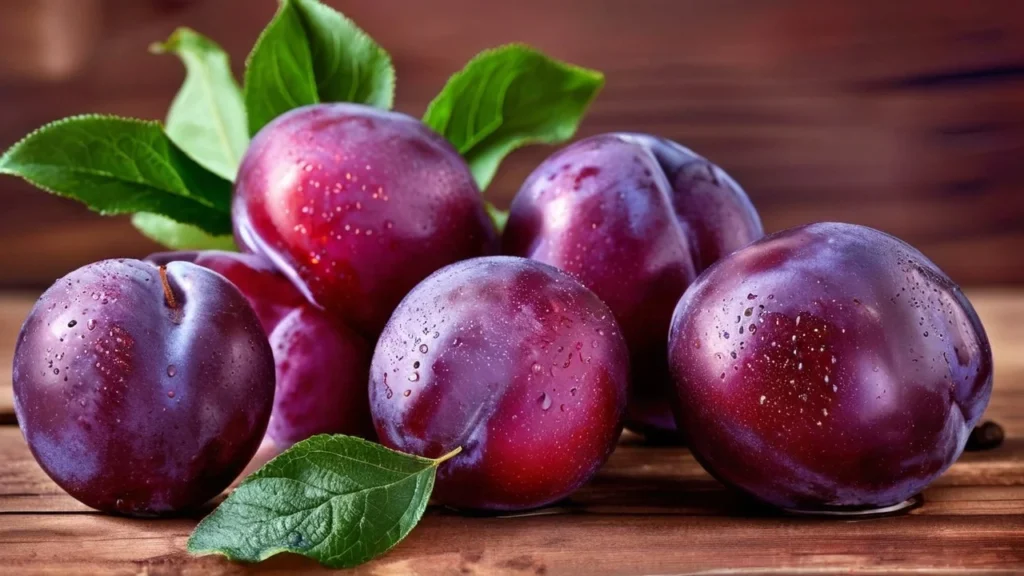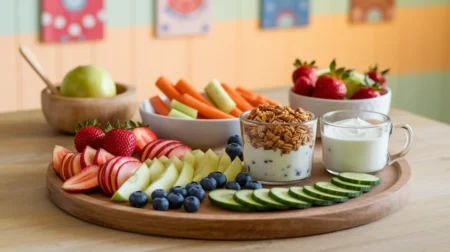Plums: A Juicy, Nutrient-Rich Fruit with Surprising Health Benefits
Key Takeaways:
- Plums are rich in vitamins, fiber, and antioxidants.
- They support digestion, improve heart health, and aid in weight management.
- Plums are versatile and can be enjoyed fresh, dried (as prunes), or cooked.

Nutritional Profile of Plums
Plums are small but packed with essential nutrients. Here is the nutritional content of one medium-sized plum (about 66 grams):
| Nutrient | Amount |
|---|---|
| Calories | 30 kcal |
| Carbohydrates | 7.5 grams |
| Sugars | 6.6 grams |
| Protein | 0.5 grams |
| Fat | 0.1 grams |
| Dietary Fiber | 0.9 grams (4% DV) |
| Vitamin C | 6.3 mg (10% DV) |
| Vitamin K | 5.7 mcg (7% DV) |
| Potassium | 104 mg (3% DV) |
High in Vitamin C
Plums are a good source of vitamin C, an antioxidant that plays a vital role in immune function, collagen production, and overall skin health.
Rich in Antioxidants
Plums contain powerful antioxidants, particularly polyphenols, that help reduce inflammation and protect cells from damage caused by free radicals.
Health Benefits of Plums
1. Supports Digestive Health
Plums are high in dietary fiber, which promotes regular bowel movements and prevents constipation. Dried plums, known as prunes, are particularly famous for their laxative properties, making them a natural remedy for digestive issues.
2. Improves Heart Health
The fiber, potassium, and antioxidants in plums contribute to cardiovascular health. Fiber helps lower cholesterol levels, while potassium aids in regulating blood pressure. The antioxidants in plums also help reduce inflammation, which is a key factor in heart disease.
3. Aids in Weight Management
Low in calories but high in fiber and water content, plums can help promote feelings of fullness, making them a great addition to a weight management diet. The natural sweetness of plums also satisfies sugar cravings without the need for high-calorie snacks.
4. Enhances Bone Health
Prunes, in particular, have been linked to improved bone density. Studies suggest that the polyphenols and potassium in prunes help strengthen bones and reduce the risk of osteoporosis.
Types of Plums
There are many different varieties of plums, each with unique flavors, colors, and textures. Below are some common types:
| Type | Description |
|---|---|
| European Plums | These are small, oval-shaped plums with a sweet-tart flavor. They are often dried into prunes. |
| Japanese Plums | Larger, juicier, and rounder than European plums, these are typically eaten fresh. |
| Damson Plums | These are small, dark purple plums with a tart flavor, commonly used in cooking and making preserves. |
| Greengage Plums | Known for their green skin and sweet flavor, they are often used in desserts. |
European Plums
European plums are smaller and firmer, making them ideal for drying into prunes. They have a sweet-tart flavor that intensifies during the drying process.
Japanese Plums
Japanese plums are larger and juicier, with a more delicate and sweet flavor. They are perfect for snacking or adding to fruit salads.
How to Incorporate Plums into Your Diet
Plums are versatile and can be used in a variety of dishes, from sweet to savory. Here are some delicious ways to add plums to your meals:
1. Fresh Plums as a Snack
Enjoy fresh plums on their own as a quick and healthy snack. They’re sweet, juicy, and portable, making them an excellent choice for on-the-go eating.
2. Add to Salads
Slice fresh plums and add them to salads for a burst of sweetness. They pair well with arugula, goat cheese, and walnuts.
3. Plum Smoothies
Blend plums into your favorite smoothies for a refreshing and nutrient-packed drink. Pair them with spinach, almond milk, and a banana for a nutritious start to your day.
4. Plum Sauce for Cooking
Make a savory plum sauce to serve with meats like duck or pork. Simply simmer plums with vinegar, soy sauce, garlic, and ginger to create a tangy and slightly sweet glaze.
Plums for Skin Health
The high content of vitamin C and antioxidants in plums makes them excellent for promoting healthy, glowing skin. Vitamin C is essential for collagen production, which keeps skin firm and reduces signs of aging. Antioxidants neutralize free radicals, protecting the skin from oxidative damage caused by environmental factors.
Prunes: The Dried Form of Plums
Prunes are simply dried plums, and they offer many of the same health benefits as fresh plums. In fact, prunes are even more concentrated in nutrients like fiber, making them an excellent natural remedy for digestive issues.
Health Benefits of Prunes
- Digestive Aid: Prunes are famous for their ability to relieve constipation thanks to their high fiber content.
- Bone Health: Prunes are rich in boron and potassium, both of which contribute to maintaining strong bones.
- Blood Sugar Control: The fiber in prunes helps slow down the absorption of sugar into the bloodstream, which may help control blood sugar levels.
Conclusion
Plums are a delicious and nutritious fruit that offer a wide range of health benefits. Whether you enjoy them fresh, dried as prunes, or cooked into sauces and desserts, plums are a versatile addition to any diet. They support digestion, boost heart health, and provide essential vitamins and antioxidants. With so many varieties to choose from, there’s a plum for every palate and occasion.
FAQ
Q: How should I store fresh plums?
A: Fresh plums should be stored at room temperature until they soften slightly. Once ripe, they can be refrigerated to extend their shelf life for up to 5 days.
Q: Are prunes as healthy as fresh plums?
A: Yes, prunes are just as healthy, if not more so, than fresh plums. They are higher in fiber and antioxidants due to the drying process.
Q: Can I freeze plums?
A: Yes, you can freeze plums. Simply pit and slice them before freezing. They can be stored for up to 6 months and used in smoothies or baking.
Q: Are plums good for weight loss?
A: Yes, plums are low in calories and high in fiber, making them a great option for those looking to manage their weight.










